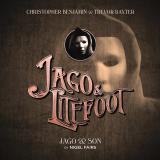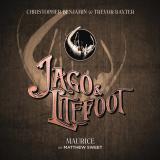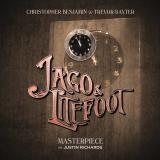Reviews | ||
Written by Nigel Fairs, Matthew Sweet, Simon Barnard, Paul Morris and Justin Richards Directed by Lisa Bowerman Produced by David Richardson Big Finish Productions, 2016 “Good Lord! Look at us, Professor – reflected in that puddle! We look positively ghastly – the both of us!” “You’re right, Henry …” Henry Gordon Jago and Prof George Litefoot It’s amazing to think that 40 years ago last March, Doctor Who fans were introduced to the unlikely combination of Victorian showman Henry Gordon Jago and East London police pathologist Professor George Litefoot in the Tom Baker serial The Talons of Weng-Chiang. Although the two characters never formally returned in the TV series, they were so fondly remembered by fans that their popularity took on a life of its own. Indeed, it’s difficult to recall any other characters in the life of the classic and modern TV series that could have conceivably had spin-off adventures in the broader Whoniverse. Jago and Litefoot’s creator Robert Holmes created similar unconventional and roguish pairings in many of his Doctor Who serials (and even a few Blake’s 7 episodes), eg Spandrell and Engin in The Deadly Assassin, Garron and Unstoffe in The Ribos Operation, Glitz and Dibber in The Trial of a Time Lord – but none seem to have had the appeal of Jago and Litefoot. Yet amazingly, since 2009, Big Finish has given the characters a whole new lease of life and a devoted fanbase, some of whom probably weren’t even alive at the time of the original broadcast of The Talons of Weng-Chiang. Jago & Litefoot started as a seemingly one-off and obscure Companion Chronicle called The Mahogany Murderers and within the space of eight years has spawned 13 boxsets plus a special release pairing the duo with Sontaran butler Strax (the Sontarans being another Holmes creation). This review focuses on Volume 11. Whereas much of BF’s recent output has sought to integrate and celebrate the mythology of Doctor Who’s classic and modern incarnations, Volume 11 of Jago and Litefoot’s adventures has delved further back into Doctor Who’s past and pitted the two amateur detectives against the Doctor’s arch nemesis the Master, who in 2016 year celebrated his/her own milestone of 45 years. While there’s great potential in the idea of pitting the two amateur sleuths against one of the Doctor’s deadliest adversaries, the execution is not quite as satisfying as the inspiration. Certainly, the box set artwork hints that the Master must play a quite dominant role across the four tales in the box set (not to mention shoehorning the Sixth Doctor into the overall saga as well). Yet while the Master is indeed present in the four tales, he is not (as you might think) the “big bad” – that is, someone who manipulates events from behind the scenes while getting others to do his bidding. It is not until the concluding chapter – Masterpiece – that the evil Time Lord comes into his own. The Master, though, does share some terrific dialogue in the opening and closing scenes of the second play Maurice with that serial’s villain and is wonderfully wicked in its climactic moments.
As for whether the “son” of the title is indeed Jago’s, time will tell. Regardless, there is a wonderful chemistry between Benjamin’s flamboyant, yet reticent and quite unheroic Jago and James Joyce’s Junior whose dialogue just oozes youthful enthusiasm and a hero worship of his father that leaves Jago duly beaming and mortified! There’s even a “bereavement” scene between the two characters that’s touching and humorous! You get the strong impression from Fairs’ writing that the story is only half-concluded and that its premise will be revisited later. Certainly, little to no explanation is given for the abnormalities that the principal characters encounter beneath Professor Bazemore’s dig ...
The other interesting aspect of the story is the role of the Doctor in this tale. Although the Time Lord is only mentioned in Maurice, his influence is felt nonetheless. You are reminded of just how much of an impact the Time Lord must have on Earth’s history, even when he’s not particularly interventionist – and how he seemingly attracts danger whenever he appears. Even the simple, unselfish and gracious act of leaving a gift for a friend in the wrong time period can have serious repercussions – both for that friend and other peers in his circle.
The performances and production qualities of this Jago & Litefoot box set live up to the bar that Big Finish regularly sets itself. Hearing Benjamin and Baxter’s voices unaltered by the years almost takes you back to their one-off appearance in The Talons of Weng-Chiang a good 40 years ago! Lisa Bowerman also impresses as feisty publican Ellie, a character that has been involved in the revival of the Jago & Litefoot saga since The Mahogany Murderers. Ellie’s cockney East London accent is completely unrecognisable from the more refined, cultured tones of 26th century archaeologist Bernice Summerfield – if you don’t necessarily follow the careers of many of the names that regularly contribute to the BF stable, then you wouldn’t even realise they are both Lisa Bowerman. And to boot, Bowerman also directs this box set as well. Colin Baker’s appearance as the Sixth Doctor is small but as you’d expect of the great man, his performance as “ol’ Sixie” is near perfect and his presence in the boxset’s climactic showdown does not overshadow the true protagonists in Jago and Litefoot. It’s difficult to compare Vol 11 of Jago & Litefoot to previous or subsequent volumes (this reviewer hasn’t listened to the other box sets) but overall, when compared to BF’s broader Doctor Who-related content, it is highly entertaining. Apart from Masterpiece, the various serials are creative, comedic and even theatrical – not unlike the theatre manager that makes this amateur detective pairing so loved by fans. Vol 11 is both a good introduction to the Jago & Litefoot series (if you’re only familiar with the characters from The Talons of Weng-Chiang) and a great stepping-on point if you haven’t heard any of the other box sets. With 13 lots of adventures under their belts, these wily old dogs aren’t showing any signs of slowing down! Filters: Big Finish Audio Jago & Litefoot Series 11 |
 The villains in the opener Jago & Son are of an earthlier disposition than the Master, although their divine purpose is indeed based in the extra-terrestrial. Nevertheless, their incompetence would easily disappoint the evil Time Lord! In all, Nigel Fairs’ opener is farce from start to finish as Jago (Christopher Benjamin) encounters a mysterious young man who claims to be Henry Gordon Jago Junior (even though Mr J swears until he’s blue in the face in his own profligate, baroque Victorian lingo that he doesn’t have any offspring). Meanwhile, Professor Litefoot (Trevor Baxter) has caught up with an old flame in archaeologist Professor Jean Bazemore (the wonderfully pompous Rowena Cooper). Prof Bazemore has returned to the British Isles after years away unearthing ancient Egyptian tombs to uncover something infinitely older in London’s catacombs. Jean’s strong anti-establishment character is the opposite of the reserved and chivalrous Litefoot yet they gel brilliantly, even if the former’s more masculine demeanour blindsides both Jago and Inspector Quick (Conrad Asquith). Indeed, there are a few LGBT jokes and references that go over the heads of the Victorian characters but will leave a smile on the faces of 21st century listeners!
The villains in the opener Jago & Son are of an earthlier disposition than the Master, although their divine purpose is indeed based in the extra-terrestrial. Nevertheless, their incompetence would easily disappoint the evil Time Lord! In all, Nigel Fairs’ opener is farce from start to finish as Jago (Christopher Benjamin) encounters a mysterious young man who claims to be Henry Gordon Jago Junior (even though Mr J swears until he’s blue in the face in his own profligate, baroque Victorian lingo that he doesn’t have any offspring). Meanwhile, Professor Litefoot (Trevor Baxter) has caught up with an old flame in archaeologist Professor Jean Bazemore (the wonderfully pompous Rowena Cooper). Prof Bazemore has returned to the British Isles after years away unearthing ancient Egyptian tombs to uncover something infinitely older in London’s catacombs. Jean’s strong anti-establishment character is the opposite of the reserved and chivalrous Litefoot yet they gel brilliantly, even if the former’s more masculine demeanour blindsides both Jago and Inspector Quick (Conrad Asquith). Indeed, there are a few LGBT jokes and references that go over the heads of the Victorian characters but will leave a smile on the faces of 21st century listeners! The second instalment Maurice, written by Matthew Sweet, is a very different “beast” in tone and pace to Jago & Son. The story focuses on French composer, pianist and conductor Maurice Ravel (1875-1937), better known for his composition Boléro, but set some 30 years before that famous piece. Indeed, the musical work that the young Ravel (played by Andy McKeane) works on in this tale - Gaspard de la nuit, which was inspired by the book by French author Aloysius Bertrand, and which premiered in Paris in 1909 – plays a pivotal role in the story. Litefoot finds himself thrust into a macabre fantasy world in which many strange elements of Ravel’s composition seemingly come to life. McKeane impresses as Ravel and the villain, even though his hackneyed French accent can sometimes grate on the listener.
The second instalment Maurice, written by Matthew Sweet, is a very different “beast” in tone and pace to Jago & Son. The story focuses on French composer, pianist and conductor Maurice Ravel (1875-1937), better known for his composition Boléro, but set some 30 years before that famous piece. Indeed, the musical work that the young Ravel (played by Andy McKeane) works on in this tale - Gaspard de la nuit, which was inspired by the book by French author Aloysius Bertrand, and which premiered in Paris in 1909 – plays a pivotal role in the story. Litefoot finds himself thrust into a macabre fantasy world in which many strange elements of Ravel’s composition seemingly come to life. McKeane impresses as Ravel and the villain, even though his hackneyed French accent can sometimes grate on the listener. We meet two more historical figures in Simon Barnard and Paul Morris’s The Woman in White – the 19th century Shakespearean thespian Sir Henry Irving (played by one-time Doctor Who guest star Edward de Souza) and Irving’s theatre manager Bram Stoker (Jonathan Forbes), the future author of Dracula. Aside from borrowing elements very heavily from Stoker’s famous novel and what is known of the Irving/Stoker partnership, Barnard and Morris’s titular character is also clearly influenced by the 2011 Doctor Who episode The Curse of the Black Spot. De Souza is wonderfully over the top as the intolerant, bewildered Irving while Forbes brings the right level of naivety to the fresh-faced, inexperienced yet effusive Stoker. Special mention should also go to BF alumni Robbie Stevens who again displays versatility as the villainous Mr Manners (Stevens previously impressed as both a crusty British MP and a union shop steward in 2015’s We are the Daleks).
We meet two more historical figures in Simon Barnard and Paul Morris’s The Woman in White – the 19th century Shakespearean thespian Sir Henry Irving (played by one-time Doctor Who guest star Edward de Souza) and Irving’s theatre manager Bram Stoker (Jonathan Forbes), the future author of Dracula. Aside from borrowing elements very heavily from Stoker’s famous novel and what is known of the Irving/Stoker partnership, Barnard and Morris’s titular character is also clearly influenced by the 2011 Doctor Who episode The Curse of the Black Spot. De Souza is wonderfully over the top as the intolerant, bewildered Irving while Forbes brings the right level of naivety to the fresh-faced, inexperienced yet effusive Stoker. Special mention should also go to BF alumni Robbie Stevens who again displays versatility as the villainous Mr Manners (Stevens previously impressed as both a crusty British MP and a union shop steward in 2015’s We are the Daleks). The final instalment Masterpiece brings the investigative duo and publican Ellie (Lisa Bowerman) face to face with the Master himself, played throughout this box set by stalwart Geoffrey Beevers. Beevers’ silky tones, dripping with delicious mischief and menace (butter certainly doesn’t melt in this Time Lord’s mouth!), reinforce why his version of the Master is ideally suited to audio. It’s just a pity that the so-called “masterpiece” of the story is quite underwhelming. Admittedly the Master is in a weakened state (it is very clear by the climax exactly when in the Master’s timeline Masterpiece occurs) but even he would agree that it’s a pretty unambitious plot by his standards. Perhaps the blame should be levelled not so much at the Master as the writer in Justin Richards. Richards seems to have a penchant for delivering “by the numbers” stories that are quite dull, slow-moving and relatively undramatic (his concluding piece for the last series of the Blake’s 7 audio adventures was equally uninspiring, as was his contribution to The Diary of River Song Vol 1). Masterpiece sadly falls into that criteria. Perhaps it’s because Richards is often busy with other projects beyond BF but if that’s the case, then it’s even more reason for him to take a step back and let someone with fresh ideas take on the writing duties.
The final instalment Masterpiece brings the investigative duo and publican Ellie (Lisa Bowerman) face to face with the Master himself, played throughout this box set by stalwart Geoffrey Beevers. Beevers’ silky tones, dripping with delicious mischief and menace (butter certainly doesn’t melt in this Time Lord’s mouth!), reinforce why his version of the Master is ideally suited to audio. It’s just a pity that the so-called “masterpiece” of the story is quite underwhelming. Admittedly the Master is in a weakened state (it is very clear by the climax exactly when in the Master’s timeline Masterpiece occurs) but even he would agree that it’s a pretty unambitious plot by his standards. Perhaps the blame should be levelled not so much at the Master as the writer in Justin Richards. Richards seems to have a penchant for delivering “by the numbers” stories that are quite dull, slow-moving and relatively undramatic (his concluding piece for the last series of the Blake’s 7 audio adventures was equally uninspiring, as was his contribution to The Diary of River Song Vol 1). Masterpiece sadly falls into that criteria. Perhaps it’s because Richards is often busy with other projects beyond BF but if that’s the case, then it’s even more reason for him to take a step back and let someone with fresh ideas take on the writing duties. Home Region:
Home Region: